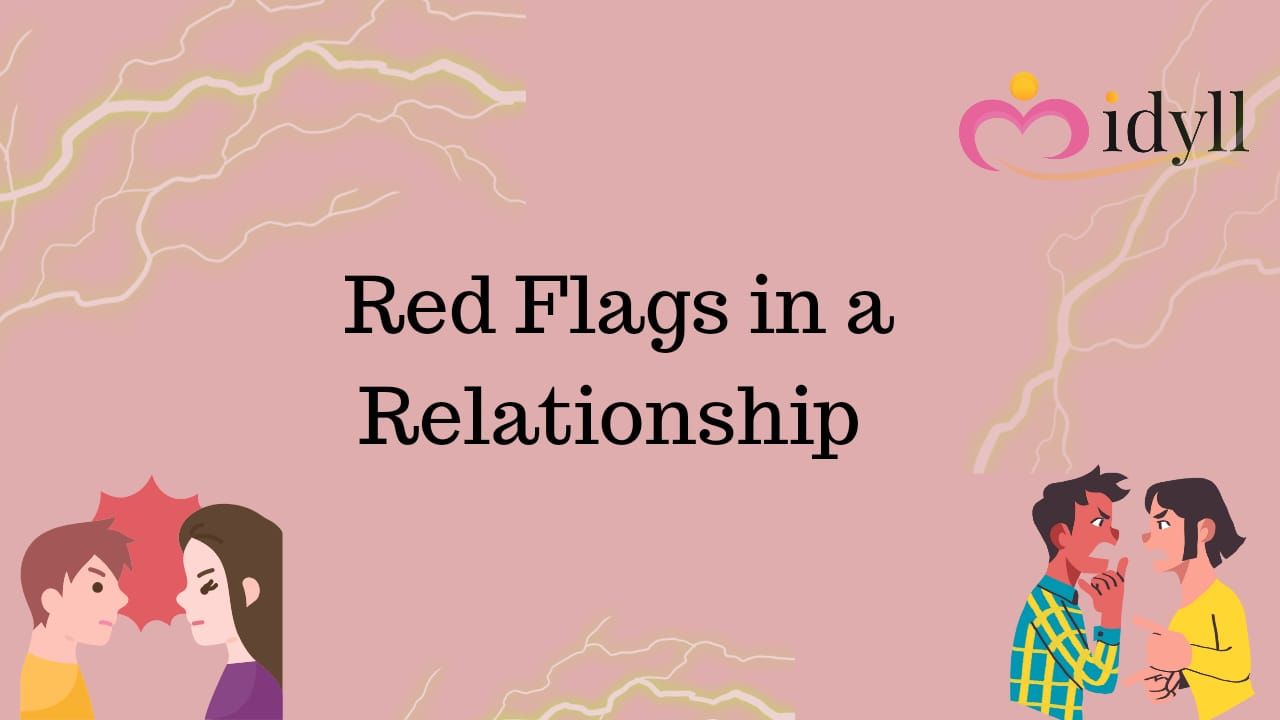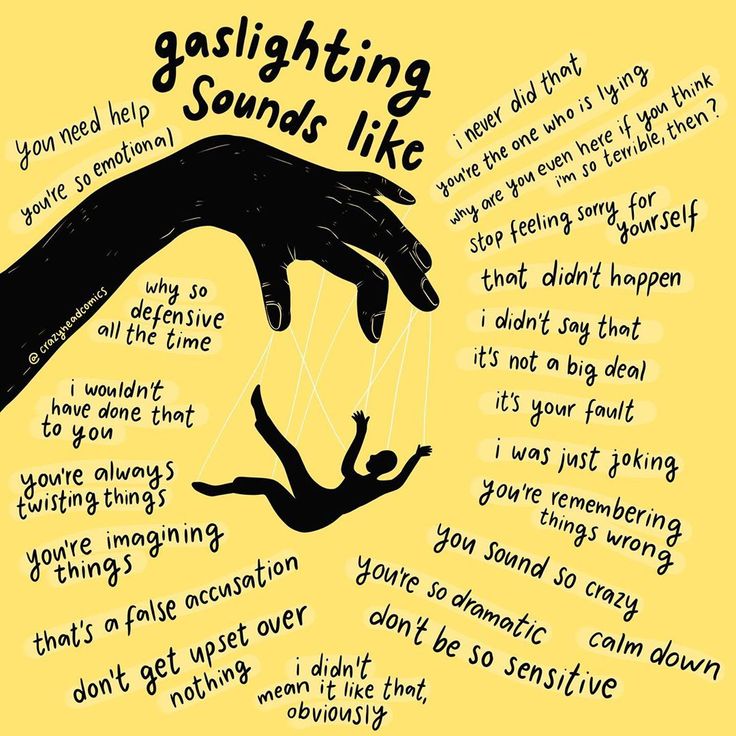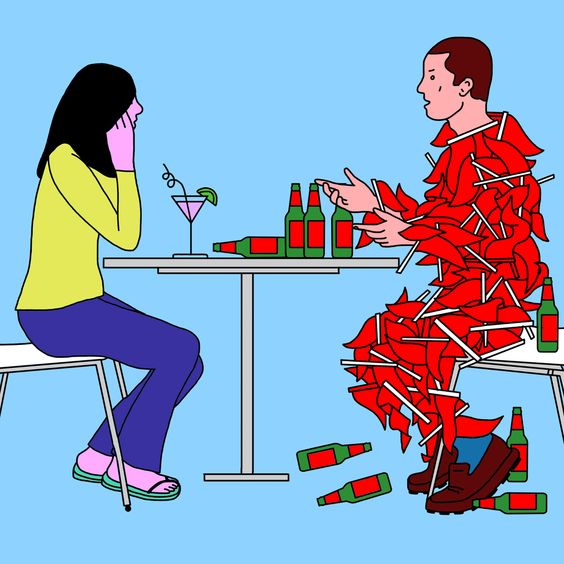50 red flags in a relationship.

"In love's tangled dance, heed the red flags' call,
For the whisper of troubles that may befall,
Listen well, my friend, before you take the fall."
Let us talk about red flags in a relationship
1. Lack of Communication: Good communication lies at the foundation of every good relationship and removes red flags in a relationship. When partners have trouble communicating freely and authentically, this can lead to misinterpretation of each other’s points of view, unresolved issues, and resentments that build up inside. It’s essential to recognize when there’s no communication or when communication is difficult and make an effort to do something about it to keep the relationship from getting worse and avoid red flags in a relationship.
2. Constant Criticism: Criticism constantly hurled around in a relationship can also take a heavy toll on one’s emotional well-being. The other partner feels criticised relentlessly and ultimately undermined, resulting in a diminishing sense of self-value and self-love. Constructive feedback is necessary to grow, but you don’t want constant criticism and keeping aside red flags in a relationship.
3. Controlling Behavior: Red flag in a relationship- Control. It kills off individuality and autonomy when one partner attempts to control and direct the other’s behaviour. It can take many different forms from watching everything you do to deciding things for you without consulting you first.
4. Ignoring Boundaries: In any relationship, boundaries define where one partner’s comfort ends and another starts. These boundaries should not be taken lightly and ignoring them is a huge warning sign for getting rid of a red flag in a relationship. It means you have no respect towards your companion’s emotions, needs, and privacy.
5. Isolation: One of the methods used in an abusive relationship to control is isolation, where one partner will purposefully cut off their partner from friends and family. The isolation this behaviour breeds is dangerous as it leaves no safety net for the victim and increases red flags in a relationship. Oftentimes isolation begins small, and the abuser will dismiss and belittle certain friends or family members causing you to see them as unappealing or dangerous.
6. Manipulation: Dirty tricks such as guilt-tripping, emotional blackmailing, or deceiving your partner can constitute manipulative behaviour and a red flag in a relationship. Manipulators usually use their partner’s feelings as their weapon, taking advantage of the weak points, in a healthy couple, you can see love, trust, and respect among them.
7. Lack of Trust: Trust sets the foundation for all successful relationships. When absent, there is uncertainty and there is also jealousy and even suspicion, there is a red flag in a relationship. Trust should be established through genuine and transparent communication, being consistent with oneself and others, within a healthy partnership. Lack of trust might arise due to past betrayal, or unreconciled matters and increase of red flags in a relationship.
8. Frequent Mood Swings: An emotionally volatile partner can be difficult to deal with in any relationship. As an upshot of mood swings, the other mate cannot expect his dear companion’s sentiments accurately.
9. Financial Secrets: Transparency with money is crucial to any good partnership. Mistrust and instability inevitably come when people do not disclose financial facts from one another – or when one individual in the partnership does not discuss his/her finances and thus digs a red flag in a relationship.
10. Lack of Support: So be sure to find a supportive and encouraging partner. If your other half constantly lets you down with regard to aspirations and undermines your ambitions, there’s no compatibility or reciprocal compassion.
11. Substance Abuse: “Addiction of any kind — whether it’s with alcohol, substances or another destructive behaviour — is extremely damaging in a relationship”. These behaviours often result in irregular activities, irresponsible behaviour, financial pressure, emotional turmoil, etc. Substance abuse problems can create uncertainty.
12. Infidelity: Cheating is a major betrayal of trust in a relationship. It shows itself as intellectual and/or physical infidelity and can bring about extreme emotional and psychological repercussions. Cheating on your partner usually has a bad impact!
13. Emotional Neglect: Emotional neglect is when someone consistently doesn’t show any sort of emotional support, recognition, or awareness towards their partner. The second spouse may feel lonely, unwanted, and ignored and dig up red flags in a relationship.
14. Disregard for Your Feelings: In a healthy relationship, both people should care about each other's feelings and needs. To ignore how you feel, to always brush off your worries, or to invalidate your experience, is an act of pushing away, creating distance emotionally.
15. Excessive Jealousy: Jealousy is not harmful to a certain extent — but over-possessive jealousy can be poisonous. It could result in abusive type conduct, ownership emotions, and lack of confidence, at the connection level. This kind of jealousy typically comes from the man’s own insecurity lack of trust and resentment.
16. Lack of Intimacy: For a healthy and satisfying relationship, both physical and/or emotional intimacy is essential. Emotional distance and unhappiness are the product of no intimacy.
17. Blame-Shifting: Blamers tend to constantly pass the buck and deny any ownership or accountability for their own choices. It can impede individual/relational development as they don’t permit conflicts to be resolved.
18. Avoidance of Conflict: Conflict suppression can appear serene — but at its core, it allows issues simmering just under the surface to remain unaddressed. Unspoken anger and unresolved issues may accumulate over time into simmering and resentment.
19. Constant Criticism of Others: If your partner routinely judges other people, it can be an indicator of unexpressed resentment. That same criticism could come your way, breeding a toxic.
20. Disinterest in Your Well-being: An indifferent or uninterested partner may place his or her needs above your own. In a healthy relationship, you care about how he/she feels physically and emotionally just as much as you do.
21. Overly Self-Centered: If your partner is too narcissistic they may find it difficult to consider how you feel, what you need or what you think. This pattern manifests in feeling unworthy or ignored within the connection.
22. Unresolved Past Trauma: In a relationship unresolved childhood trauma can show up in different forms: you may be emotionally explosive; you might act irrationally, or you might avoid specific things that bring back your earliest memories of pain.
23. Resistance to Growth: A mate who is opposed to own or relational evolution can impede momentum and result in stasis. Healthy partnerships encompass encouragement of one another’s progress, whether in terms of personal development, professional advancement, or even the relationship itself.
24. Disrespect for Your Opinions: Both partners in a healthy love affair need to hold one another’s views in consideration and esteem regardless of their contrasts. Rejecting what you have to say makes you feel unworthy and insignificant resulting in causing red flags in a relationship.
25. Lack of Empathy: empathy is the act of being able to comprehend and feel your partner’s feelings and experiences. The absence of empathy can result in an emotional void and detachment from one another.
26. Inconsistent Commitment: If you're with someone who flaps back and forth all the time on commitment in your relationship, you’re going to be incredibly unstable and uncertain, right? I believe it's crucial for both parties to know each other’s intentions & level of investment in the relationship and to avoid red flags in a relationship.
27. Refusing to apologize: Apologising for your mistakes and taking responsibility for your mistakes are important in a healthy relationship. A partner who refuses to apologize may struggle with accountability, making it harder to resolve conflict and causing red flags in a relationship.
28. Excessive possession: Too much possession can lead to control and stranglehold in a relationship. Partners must trust and respect each other’s independence and personal space.
29. Mutual non-reciprocity: Good relationships are built on mutual giving and receiving. A partner who takes all the time without commitment creates awkward energy, which can lead to feelings of frustration and resentment.
30. Secretive Behavior: Consistently hiding actions or motives can lead to trust issues and suspicion. Open and transparent communication is essential to maintaining trust and removing red flags in a relationship.
31. Negative influences: A partner who negatively affects your life choices can pull you away from your goals or values. Surrounding yourself with positive influences that align with your aspirations is important to avoid red flags in a relationship.
32. Lack of appreciation: Feeling unappreciated in a relationship can lead to dissatisfaction and emotional withdrawal. It is important to express gratitude and appreciation for your partner’s efforts in maintaining a healthy relationship.
33. Values Conflict: Significant differences in values, such as religious beliefs, political views, or social goals, can cause ongoing conflict and difficulties in a relationship.
34. Frequent Breakups and Makeups: Constant instability in a relationship, characterized by frequent breakups and reconciliations, can be emotionally draining. It often indicates unresolved issues.
35. Unresolved anger issues: Unchecked anger can hurt partners and the relationship. Managing and handling anger appropriately is essential to a peaceful and loving relationship.
36. Lack of transparency: Transparency and honesty are critical to building and maintaining trust. To build a solid foundation of trust, partners need to be open about their actions, thoughts, and feelings.
37. Gaslighting: Gaslighting is a form of emotional manipulation where one partner distorts the facts, while the other questions their perception of reality. Understanding gaslighting behaviour is essential to protecting your mental and emotional well-being.

38. Manipulative Behavior: Manipulative behaviour can lead to poor decision-making, financial issues, and the instability of a relationship and henceforth red flags in a relationship It is important that we consider the consequences of impulsive actions and make considered decisions together.
39. Over-reliance: Relying on a partner for emotional or financial support can lead to tension and imbalance.
40. Lack of interest in personal growth: A partner who shows no interest in personal growth can hinder your personal growth. Two individuals in a healthy relationship should support and encourage each other in their journey of personal growth and personal growth.
41. Miscommunication: Frequent communication breakdowns can lead to misunderstandings and frustration in a relationship. When partners struggle to maintain consistent and open communication.
42. Inextricable power: Flexibility and intransigence can lead to constant power struggles in a relationship. Compromise is a cornerstone of a healthy relationship, as it allows both individuals to meet their needs and wants while satisfying the desires of their partner. Failure to compromise can lead to resentment and conflict.
43. Inadequate conflict resolution: Poor conflict resolution skills can lead to long-term resentment. When partners are unable to manage and resolve conflict in healthy and constructive ways, unresolved conflict can persist, creating a red flag in a relationship and emotional distance.
44. Responsibility Avoidance: A partner who constantly avoids taking responsibility for their actions can create a red flag in a relationship. Taking responsibility for your mistakes is important for personal growth and maintaining confidence.
45. Unilateral Decision Making: In a healthy partnership, decisions are made jointly, as these choices often affect both individuals. Unilateral decision-making, where one partner always makes key decisions
46. Withholding love: Withholding love creates an emotional gap in a relationship, whether physical or emotional. Partners need to consistently express their love and affection in order to have a strong bond. The lack of love can make her feel neglected and give her the impression that the relationship is becoming distant.
47. Lack of communication: Physical and emotional intimacy is one of the most important elements of a romantic relationship. Lack of intimacy can lead to emotional disconnect and dissatisfaction.
48. Breach of trust: Repeated breaches of trust undermine the foundation of a relationship. Trust is central to a healthy relationship, and when it’s continually destroyed through deception, lies, or other behaviours, rebuilding it can be a challenge.
49. Emotional baggage: Unresolved emotional baggage from past experiences can greatly affect a relationship. Personal trauma, unresolved conflicts, or past negative relationships may manifest as problem behaviour, emotional instability and red flags in a relationship.
50. Ignoring future plans: A partner who constantly ignores your plans and future aspirations can indicate a red flag in a relationship.

Conclusion
Thus, recognizing and dealing with the red flags in the intricate tapestry of love and sharing is a brushstroke of wisdom. These warning signs are not obstacles but opportunities for growth, understanding, and ultimately healthy relationships. By heeding red flags in a relationship, we move past the shadow of uncertainty and doubt into a future filled with respect, trust and love.
Happy Dating!
Life is short, experience the unforgettable!
Download Idyll- The Perfect College Dating App!
